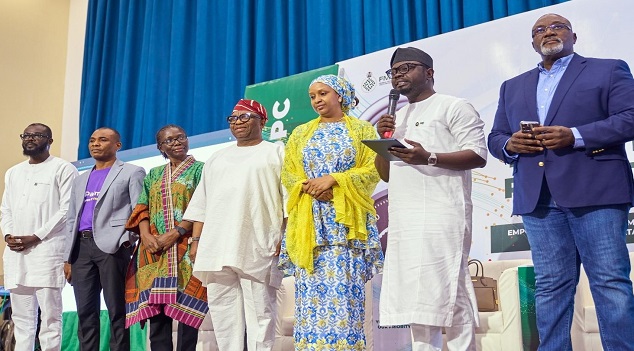News
Corporate Organisations Must Get Involved in the Fight Against Substance Abuse in Nigeria

By Odunayo Sanya, Executive Director, MTN Foundation
In the shadows of Nigeria’s bustling streets, a silent epidemic rages on, devouring the lives of our youth and shattering the dreams of families. Substance abuse has become a hydra-headed monster, its tentacles spreading everywhere, leaving in its wake a trail of broken lives, shattered hopes, and a nation in peril.

Odunayo Sanya, Executive Secretary, MTN Foundation
The cries of mothers who have lost their children to the grip of addiction, the anguish of fathers who have seen their sons succumb to the allure of drugs, and the despair of communities ravaged by the consequences of substance abuse – these issues echo through the land, a haunting reminder of a crisis that threatens to consume us all.
The statistics are alarming; according to the National Drug Law Enforcement Agency (NDLEA), Nigeria has one of the highest drug use prevalence rates in the world, with over fourteen million people using psychoactive substances. It reveals that 14.3% of Nigerians between age 15 to 64 have used drugs at least once in their lifetime. But behind these numbers lies a more poignant reality – a generation lost to the abyss of addiction, their potential, creativity, and innovation sacrificed on the altar of substance abuse. The Nigerian dream, once full of promise and hope, is fast becoming a nightmare, as the scourge of substance abuse threatens to undermine economic growth.
As we grapple with the challenges of nation-building, substance abuse poses a clear and present danger to our collective future. It is a ticking time bomb, waiting to unleash its full fury on our society, our economy, and our very way of life. And yet, we are sleepwalking into this catastrophe, oblivious to the devastation that awaits us. It is time to wake up, to confront this monster head-on, and to reclaim our nation from the grip of substance abuse. The future of Nigeria depends on it.
The consequences of substance abuse are multifaceted. It affects not only the individual but also their families, communities, and the nation at large. Substance abuse affects the mental and physical health of individuals, leading to increased cases of depression, anxiety, and even suicide. It also affects relationships, leading to family breakdowns, and social isolation. The impact on society is equally devastating, affecting productivity, leading to reduced economic output, and increased healthcare costs. Substance abuse is also linked to increased crime rates, violence, and social unrest.
The economic impact of substance abuse cannot be overstated. It affects productivity, leading to reduced economic output, and increased healthcare costs. Substance abuse also affects the workforce, leading to absenteeism, presenteeism, and reduced employee performance. According to a study by the World Health Organisation (WHO), substance abuse costs Nigeria over N100 billion annually.
As we struggle to rebuild our economy and create opportunities for our youth, substance abuse siphons off precious resources and talent. The billions spent on rehabilitation, healthcare, and law enforcement could be invested in education, infrastructure, and innovation. Instead, these resources have been disbursed to mitigate the damage caused by substance abuse. We owe it to ourselves, our children, and future generations to act decisively against this menace.
Corporate organisations in the country have a vital role to play in supporting the fight against substance abuse. One way to do this is through funding. Substance abuse initiatives require significant financial resources to implement effective prevention, treatment, and support programs.
The MTN Foundation, through its Anti-Substance Abuse Program (ASAP), is already making a significant impact in this area. ASAP is a comprehensive program that aims to reduce the prevalence of substance abuse among young people in Nigeria. By providing funding and resources, MTN Foundation is helping to support rehabilitation centres, counselling services, and public awareness campaigns.
There are alternative ways to support the fight against substance abuse, corporate organisations can lend their expertise to awareness and sensitization campaigns and provide in-kind donations. For example, they can provide venues for community events, expertise in areas of marketing and communications, and printing and distribution services. Additionally, corporate organisations can leverage their networks and influence to raise awareness about the dangers of substance abuse and promote initiatives aimed at preventing it.
At an internal level, corporate organisations should implement workplace policies and programs that prevent and address substance abuse. This can include employee assistance programs, drug testing, and substance abuse education and training. By creating a safe and supportive work environment, corporate organisations can help employees struggling with addiction to seek help and overcome their dependence on drugs.
In the United States, companies like CVS Health and Walmart have taken a stand against drug abuse by implementing programs to prevent opioid overdose and misuse. CVS Health, for example, has launched a program to provide naloxone, a medication that reverses opioid overdose, to patients without a prescription. Walmart, on the other hand, has implemented a system to track and prevent suspicious prescriptions, and provides disposal sites for unused medications.
In Europe, companies like IKEA and H&M are supporting the fight against drug abuse by partnering with organisations that provide treatment and support services. IKEA, for example, has partnered with the Swedish organisation, Länkarna, to provide job training and employment opportunities to people recovering from addiction. H&M has partnered with the UK-based organisation, Addaction, to provide funding and resources for treatment and support services.
Other companies, like Google and Facebook, are using their technology and platforms to support the fight against drug abuse. Google, for example, has launched a program to provide accurate and reliable information on substance abuse and treatment options through its search engine. Facebook has launched a program to provide resources and support services to people struggling with addiction, and partners with organisations to provide funding and expertise to support the fight against drug abuse.
Guinness Nigeria launched the ‘Drink Responsibly’ campaign, aimed at promoting responsible drinking habits and reducing the incidence of substance abuse. The company has also partnered with the Nigerian government and other organisations to support initiatives aimed at preventing and treating substance abuse. For example, Guinness Nigeria has provided funding and resources for the establishment of rehabilitation centres and counselling services for those struggling with addiction. These efforts demonstrate the commitment of Nigerian companies to supporting the fight against drug abuse and promoting a healthier and more responsible society.
The government, through the NDLEA, should encourage the private sector to get more involved in this fight. The agency has already shown commitment to this, even in the partnership with MTN Foundation on the ASAP programme. MTN’s involvement has been substantial, including advocacy walks, stakeholder conferences, and the inclusion of white papers. In 2024, the programme reached 87,000 students and trained 1,440 teachers across Nigeria. More such partnerships are essential because this is a collective fight. There is a need to undertake more of such partnerships because it is everyone’s fight .
As we confront the scourge of substance abuse in Nigeria, it is heartening to see corporate organisations stepping up to the plate. By providing funding, resources, and expertise, companies like MTN and Guinness are helping to stem the tide of addiction and despair that threatens to engulf our youth. But this is not just a moral imperative – it is an economic and social one too. For if we fail to act, we risk losing an entire generation to the abyss of substance abuse, with devastating consequences for our families, communities, and nation.
So let us salute these corporate champions and urge others to follow their lead. Together, we can create a Nigeria where our young people are empowered to reach their full potential, free from the shackles of addiction. A Nigeria where families are not torn apart by substance abuse, and communities are not ravaged by its consequences. It is a future worth fighting for, and one that we can achieve if we work together. The time to act is now – let us join forces to create a brighter, healthier future for ourselves, our children, and our nation.
News
PalmPay Partners FG to Drive Data Protection Awareness

PalmPay reinforced its commitment to data protection and youth empowerment with a ground-breaking partnership with the Federal Ministry of Youth Development to launch the Youth Data Protection Awareness and Training (YDPAT) Program, which is targeted at equipping over 1,000,000 Nigerian youths digitally over 3 years.

The training program, commissioned last week at the Shehu Musa Yar’ Adua Centre in Abuja, will focus on providing youths with the right knowledge and skills required to navigate the digital landscape safely. With over 70% of the Nigerian population consisting of youths, this is an important move to foster trust, security and youth-focused innovation.
Speaking at the launch, the Honourable Minister of Youth Development, Comrade Ayodele Olawande, commended PalmPay’s partnership in the actualisation of the program and described YDPAT as a bold step toward building a digitally literate and security-conscious generation.
In his words, “This is about building a privacy-first generation, one that is inclusive, future-facing, and globally competitive.” He also emphasised the low awareness of the Nigerian Data Protection Act (NDPA), 2023 and the critical shortage of certified Data Protection Officers (DPOs), despite over 500,000 data controllers operating in the country.
This position was equally supported by PalmPay’s Managing Director, Mr Chika Nwosu, who stated how data protection is as important as innovation in tech. He noted that PalmPay integrates privacy into every stage of its product development, ensuring that user information is safe.
Beyond ensuring data protection, PalmPay is committed to empowering young Nigerians with real opportunities for growth, with mentorship and internship placements for top-performing participants. It has led several youth-oriented initiatives, including the Purple Woman campaign, and Passing the Baton CSR for thousands of youths and women in urban and rural communities.
With a drive to achieve nationwide digital literacy, PalmPay is championing campaigns in Northern Nigeria, with more activations planned across various states.
News
FG to Move 5m Homes to Clean Cooking by 2030 — Minister

Ekperikpe Ekpo, minister for State, Petroleum Resources (Gas), said it is working towards a renewed target of moving about five million homes to clean cooking by 2030.

Ekpo, made the declaration while delivering the ministerial address and remarks on Monday at the opening ceremony of the 48th Nigeria Annual International Conference & Exhibition (NAICE) 2025.
This year’s conference is themed ‘Building a Sustainable Energy Future: Leveraging Technology, Supply Chain, Human Resources, and Policy.’
He explained that the target can only be made possible through increased investment in gas infrastructure in critical projects such as the OB3 and AKK pipelines, progressing to deliver gas to markets nationwide; and promoting modular and scalable gas projects, including mini-LNG and CNG stations.
According to him, the government is also ramping up efforts to improve last-mile access and stimulate local economic activity and facilitate job creation through strategic public-private partnerships in the construction, logistics, and retail segments of the gas value chain.
“His Excellency, President Bola Ahmed Tinubu, GCFR, has placed gas at the heart of Nigeria’s energy strategy. His vision, aptly captured in the phrase “From Gas to Prosperity”, reflects our national ambition to utilise our abundant natural gas resources to fuel industrialisation, create jobs, and expand access to clean and affordable energy for all Nigerians.
“Over the past year, we have taken decisive steps in line with this vision. We have expanded gas supply for industrial use, prioritising gas availability for manufacturing hubs, power generation, and industrial corridors. As of today, I’ve been reassured that every gas offtaker currently receives the gas they require for their industrial processes; Rolled out the LPG Penetration Programme, distributing cylinders across the six geopolitical zones and empowering women and youth, promoting clean cooking.
“Under the Decade of Gas Initiative, we are also making meaningful strides to unlock value across the midstream and downstream sectors.
“Notably, we have facilitated the development of gas processing facilities and virtual pipeline systems, ensuring gas reaches off-grid and underserved communities, supported private sector investment in LPG and CNG infrastructure, including autogas stations, domestic cylinder manufacturing, and distribution networks, strengthened coordination via the Decade of Gas Secretariat, driving alignment and accountability across Ministries, Departments, and Agencies, Advanced the Nigerian Gas Flare Commercialisation Programme (NGFCP), converting waste to wealth while supporting environmental goals, secured presidential approvals to address legacy debts, incentivising upstream gas supply and stabilising the domestic market”, he said.
He also said the federal government has released much-needed financial support to project promoters via the Midstream Downstream Gas Infrastructure Fund (MDGIF).
“All these efforts are anchored on a single, resolute belief, which is that Nigeria’s gas must work for Nigerians, not just as an export commodity, but as a foundation for inclusive growth, national development, and energy security.”
Speaking on the four pillars highlighted in the conference theme – technology, supply chain, human resources, and policy –- the Minister noted that each plays a vital role in shaping Nigeria’s energy future.
On technology, he said the adoption of digital solutions, automation, and data-driven tools across the gas value chain is essential.
“From reservoir monitoring to distribution analytics, emerging technologies can enhance efficiency, reduce emissions, and optimise delivery. The Ministry continues to collaborate with industry players to foster digital innovation,” he said.
He explained that a strong local supply chain is essential to sustaining the gas economy.
“Through the Nigerian Content Development and Monitoring Board (NCDMB), we are driving localisation of equipment manufacturing, pipe production, and other critical components to reduce import dependence and build national resilience.
“Our human capital remains our greatest asset. We are committed to nurturing a technically sound, diverse, and future-ready workforce through continuous training, strategic academic-industry partnerships, and deliberate youth and gender inclusion policies in the gas space.
“The Petroleum Industry Act (PIA) has provided a solid regulatory and fiscal foundation. We are implementing market-reflective gas pricing frameworks, encouraging deepwater gas development, and enforcing domestic supply obligations to drive investor confidence and sector expansion,” he noted.
News
Experts Caution e-commerce Operators on Eco-friendly Materials

Experts have urged the Nigerian e-commerce industry to use eco-friendly materials in its packaging and logistics of products to reduce carbon emissions and protect the environment.

The experts made this known at a sensitisation workshop on Greening E-commerce orgainsed by The Sustainable and Inclusive Economic Development for Decent Employment In Nigeria Programme (SEDIN) – an initiative of the German Development Agency (GIZ) in partnership with Nigerian Postal Services (NIPOST).
The experts stressed the importance of e-commerce operators in Nigeria committing to concrete climate actions and sustainable operations.
Nnaemeka Ngwu, director of the public sector initiative and a professor at Lagos Business School, urged e-commerce companies to quickly adopt sustainable green technology to minimize their environmental harm.
“E-commerce is a business enabler and a platform through which many people can get involved in trade and commerce. However, e-commerce also brings lots of issues in sustainability and climate change because of pollution,” he said.
According to him, to improve the sustainability component of e-commerce, the country must promote better packaging and logistics among operators.
“We need to green the e-commerce industry to make it more inclusive and support the climate so that it does not cause risks and issues,” he explained.
He commended the Lagos State government on the ban on single-use plastics, calling for the policy to be complemented with awareness, advocacy, and engagement so that the public understands the reason for the policy.
He noted that such awareness should be done regularly, while urging the Nigerian Postal Service to use its leadership role in the courier industry to engage other courier businesses within the space on the benefits of sustainability and the packaging and logistics issues.
In her opening remarks, Titi Oshodi, special adviser to the Lagos State Governor on Climate Change and Circular Economy, called for awareness on greening across various sectors of governance, communities and the private sector
“This will ensure that people understand the rationale behind the policies on greening and they also understand what the alternatives are,” she noted.
“This is the reason why climate literacy is a front-boner strategy for us in Lagos State,” she added.
She explained that Lagos is a commercial hub that grew its GDP due to the operations of micro, small and medium-size businesses. “We need to have them empowered, more knowledgeable about sustainability practices.”
Tola Odeyemi, postmaster-general, Nigerian Postal Services (NIPOST), said the courier can play a strategic and vital role in greening the ecosystem, noting that it has 1,174 post offices nationwide.
Odeyemi, who was represented by Ernest Mamood, general-manager of EMS Parcel Nigeria, said NIPOST is a regulator in the country’s courier industry and can use its position to sensitize other operators in the industry on the use of eco-friendly materials in packaging and logistics to cut environmental impact.

 General News3 days ago
General News3 days agoNOA Warns of Fake N1000 Notes in Circulation, How to Identify Them

 Telecom3 days ago
Telecom3 days agoMTN @ First-ever CED, Pledges to Address Subscribers’ Concerns

 E-Financial3 days ago
E-Financial3 days agoWest Africa Emerging as Crypto Adoption Epicentre- SEC Boss

 Telecom2 days ago
Telecom2 days agoNCC to Sanction Operators over Regulatory Violations

 General News2 days ago
General News2 days agoCustoms Ditches Fast Track Scheme for Authorised Economic Operator

 General News3 days ago
General News3 days agoNCC, IHS Towers Lead Others To NITRA-ALTON CNII & Telecom Sustainability Conference 2025

 Telecom3 days ago
Telecom3 days agoAirtel Nigeria Raises Infrastructure Spending to $39m

 Broadcasting3 days ago
Broadcasting3 days agoGovernment of Ghana Slams MultiChoice, Insists on DStv Price Cut

























